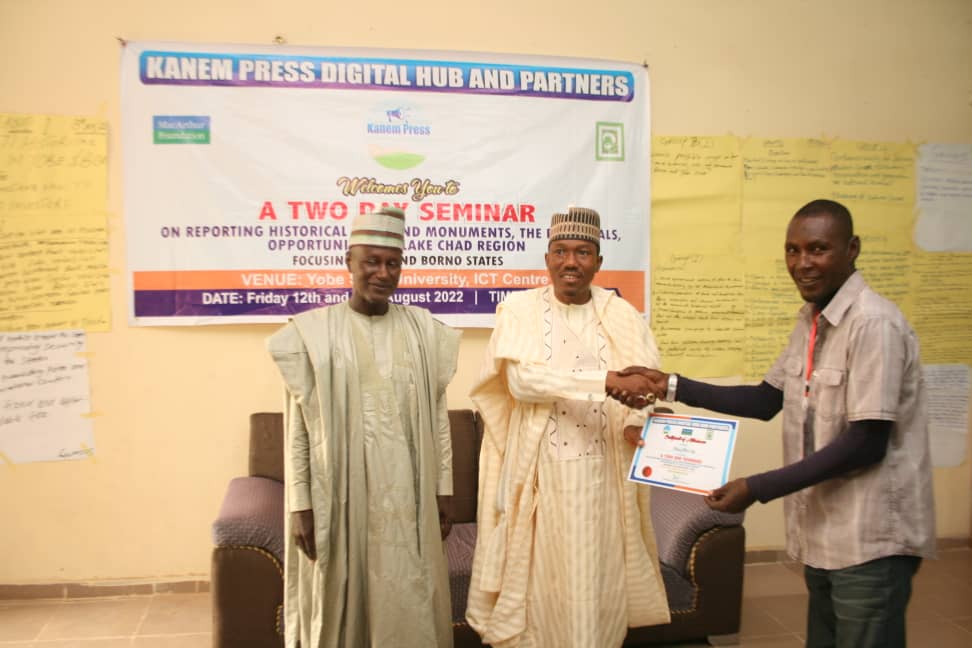Kanem Press Digital Hub has trained 73 young journalists from the Northeast region of Nigeria on reporting historical sites and monuments, and the potential opportunities that abound in the Lake Chad Region of Yobe and Borno States.
Zanna Ibrahim Mustapha, President of Kanem Press Digital Hub, in his opening remarks explained the importance of reporting historical sites and monuments and the opportunities as he said a sufficient number of cultural monuments and their good condition are one of the prerequisites for the development of tourism and for the interest of tourists in particular destinations and regions.
According to Zanna, the training was aimed at widening people’s understanding of how to report historical monuments and opportunities available in the Lake Chad region.
He thanked the Yobe State government, MacArthur foundation and Wole Soyinka Centre for Investigative Journalism (WSCIJ) for their support and assistance during the training.
The Curator of the National Museum and Monument, Mr. Mamza Ralph, harped on the imperative of preserving and restoring the old historic objects, especially in North East Nigeria saying they are the reflection of a people’s history
Mamza explained that monuments help to understand and respect people who lived in different eras with different habits and traditions.
According to him, the existence of monuments also helps to observe the changes in the societies for a better understanding of the reasons that led to the development of cities and societies and even traditions to the present.
He expressed dissatisfaction at how the Dufuna canoe (the oldest historic object in Africa) located in Dufuna village of Yobe State is being handled.
He, therefore, thanked Kaneem Press for organizing the workshop and urged its facilitator to seek government intervention in respecting, protecting, reviving and restoring cultural heritage.
Explaining the role of communication in reviving cultural heritage, another speaker, Dr Adam Kolo of the department of the Mass Communication University of Maiduguri, said it is the privileged vehicle for spreading information, knowledge and understanding.
Dr. Kolo explained that it could represent a tool for improving access to cultural resources, facilitating the recognition of heritage values by collectivity and the need for wider and extended protection.
He added that community leaders and traditional and religious institutions have strategic roles to play in restoring and reviving historical monuments in the Lake Chad region, particularly the preservation and promotion of the Dufuna Canoe historical artefact and role in social and behavioural change communication and the media in Yobe and Borno States.
Highlighting the need for reporting historical monuments and future opportunities in the Lake Chad region, Talba Lawan, a director, of history and culture in Yobe State said historical reporting makes it feasible to analyze a wider range of variables, granting improved insight into what’s happening across our societies.
He listed the three methods of reporting historical monuments as written reporting, graphics reporting and oral reporting, noting that written reporting is the most popular mode because it could be kept as legal records and as reference material, while graphics reports may be presented in the form of charts, diagrams and pictures.
He explained that a combination of written, graphic and oral reporting may be useful for effective and efficient reporting in an organization or any historic setting.
Other speakers including Dr Kyari Grema, and Alhaji Modu Bukar who is the Director of Arts and Culture at Yobe State, and Director of remedial studies at Yobe State University shared their views on reporting historical monuments and future opportunities.
All the six resource persons unanimously agreed that history is the reason for human existence and the purpose of history is revisiting the past, use what is learnt from the past to adjust to the present and planning for a better future.
The workshop was organised under the Collaborative Media Engagement for Development Inclusivity and Accountability (CMEDIA), a multi-level intervention for media independence and government accountability by the WSCIJ. CMEDIA, is supported by the MacArthur Foundation working through 26 partner organisations to improve public awareness and the ecosystem for transparency, accountability and good governance and to amplify marginalised voices, especially at state and local government levels and the private sector.







